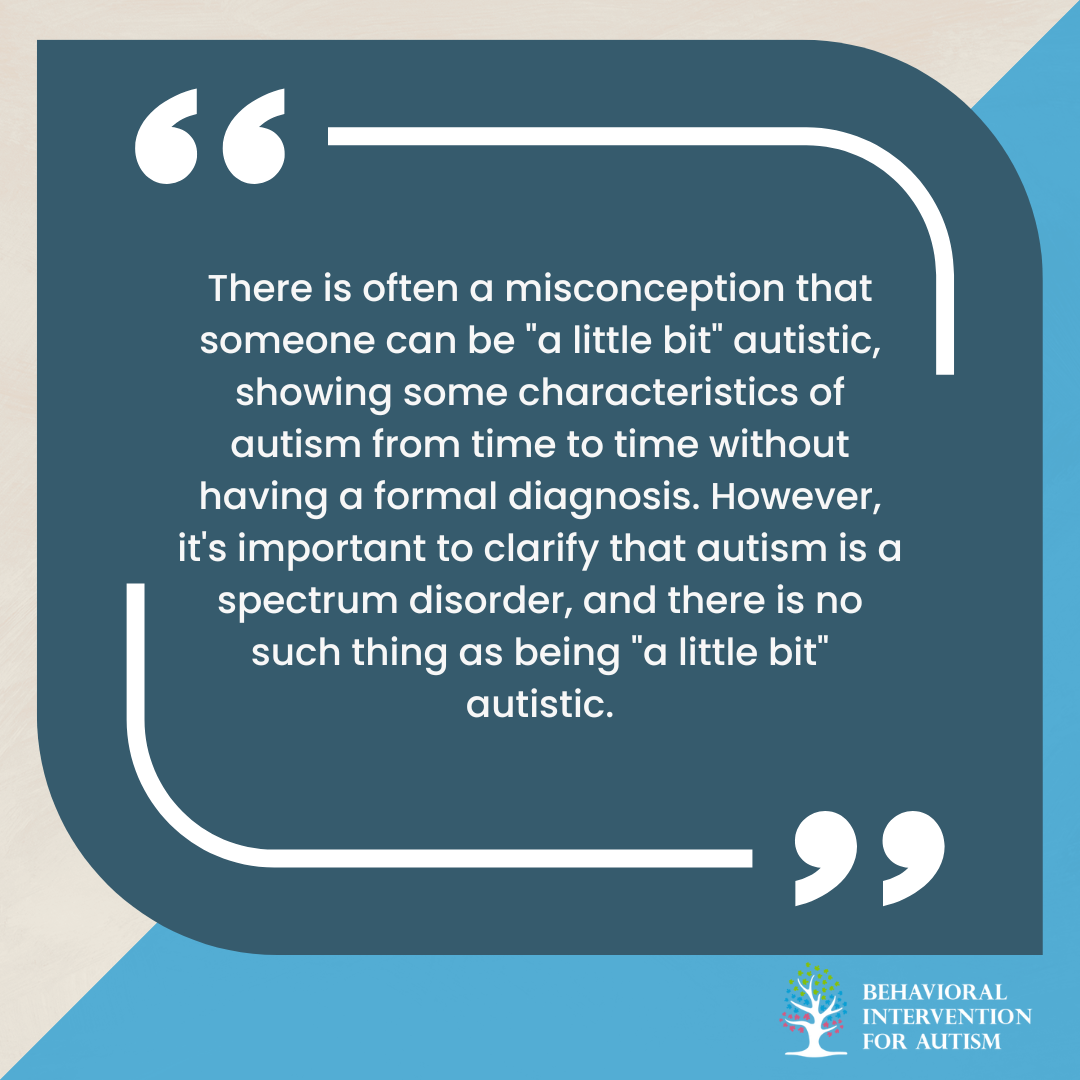
Table of Contents
Autism is a complex and diverse neurodevelopmental disorder that is characterized by a wide range of challenges and strengths. The term “autism spectrum disorder” (ASD) emphasizes the understanding that autism exists on a continuum, with individuals experiencing varying degrees of symptoms and support needs.
So this brings us to the question: “Can you be a little bit autistic?”. Let’s explore this question in further detail.

Mild Autism
“Mild autism” is an unofficial term that is commonly used to refer to a diagnosis of autism spectrum disorder level 1.
It is important to note that the term “mild” does not imply that the challenges faced by individuals with this diagnosis are insignificant or less significant than those faced by individuals with other levels of ASD. It simply reflects that the characteristics and support needs of individuals with level 1 autism may be less noticeable or less intense compared to other levels on the spectrum.
People with mild autism often exhibit traits that are less obvious and may engage in masking strategies to suppress their autism traits. This can make it challenging for others to recognize their diagnosis and understand their unique needs.
However, it is important to recognize that even individuals with mild autism can experience significant difficulties in various areas of life, such as social interaction, communication, and sensory processing.
Individuals with mild autism may face a range of challenges in their daily lives. Some of these challenges can include difficulties with social interaction, reading social cues, understanding body language, and deciphering facial expressions.
They may struggle to navigate social situations and may find it challenging to build and maintain relationships with others.
Characteristics of Autism Spectrum Disorder
Autistic individuals exhibit a range of characteristics that can vary in severity and presentation. Some common traits and behaviors associated with autism spectrum disorder include:
- Repetitive Behaviors and Sensory Challenges – Autistic individuals may engage in repetitive behaviors such as rocking, flapping, or speech to self-soothe, a behavior known as “stimming.” Additionally, they may experience sensory challenges, finding it difficult to process sensations or stimuli in their environment. This can lead to sensitivities or aversions to certain sounds, textures, or lights.
- Social Communication Difficulties – People with autism often struggle with social interactions and communication. They may have difficulty interpreting social cues, such as tone of voice, body language, facial expressions, or understanding the intent behind others’ words. Autistic individuals may also have challenges in initiating or maintaining conversations and developing meaningful relationships.
Autism is described as a spectrum of disorders because the signs and symptoms can vary widely from person to person. Some individuals will have significant behavior and communication challenges that make the possibility of an autism spectrum disorder (ASD) diagnosis more likely. Others may exhibit fewer or less noticeable signs, which can make it more difficult to identify and diagnose ASD.
It’s important to remember that every autistic individual is unique, and their experiences and needs may differ.
Can You Be “A Little Bit” Autistic?
Now that we have a brief overview of what it means to be autistic, it’s time to move on to the main topic.
Debunking the Myth
Autism is characterized by a range of symptoms and behaviors that affect individuals in different ways. While many people may display certain traits associated with autism occasionally, this does not mean they are autistic.
Autism spectrum disorder (ASD) is a neurodevelopmental condition that involves persistent challenges in social interaction, communication, and restricted or repetitive patterns of behavior.
People who are mildly autistic may have less noticeable traits that they often mask, and they may have relatively low support needs. It is crucial to distinguish between occasional quirks and behaviors associated with autism and a formal diagnosis.
Recognizing the Importance of Early Intervention
Early intervention is important for individuals on the autism spectrum, regardless of the severity of their symptoms. While some children may exhibit mild symptoms of autism, it is essential for parents and caregivers to proactively seek a diagnosis and appropriate support.
By identifying and addressing autism at an early stage, children can benefit from targeted interventions and therapies that can help them develop important skills, improve communication, and enhance their overall well-being. Delaying or neglecting a diagnosis could lead to missed opportunities for growth and potential challenges as the child grows older.
Autistic individuals with mild traits may develop coping skills and masking strategies to suppress some of their autism characteristics, making their symptoms less obvious. However, this does not mean that their autism is any less significant or impactful on their lives.
It’s important to remember that every individual with autism, regardless of the severity of their symptoms, can benefit from a therapeutic approach. With the right support and strategies, individuals with autism can thrive, develop their strengths, and lead fulfilling lives.
Conclusion
So long story short, being “a little bit” autistic is just a misconception. However, mild autism exists within the autism spectrum. It takes more than a few quirks or occasional atypical behaviors to warrant an autism diagnosis.
Seeking early intervention and support is crucial for individuals with autism, regardless of the severity of their symptoms, to ensure that they have the necessary tools and resources to reach their full potential.
Sources:
https://www.medicinenet.com/can_you_be_a_little_autistic/article.htm
https://www.verywellhealth.com/is-everyone-a-little-autistic-259950
https://www.verywellhealth.com/what-is-mild-autism-260244
https://www.tpathways.org/faqs/can-a-child-be-slightly-autistic
- 9 Common Obsessions of Children With Autism You Should Know - February 25, 2025
- What is Neurodiversity? A Guide to Embracing Differences - February 25, 2025
- Understanding Hyperfocus in Autism: What It Means and Why It Happens - February 25, 2025


